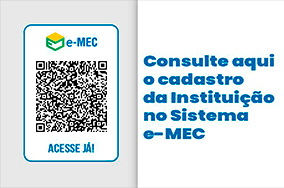| MINDSET: Emotional Intelligence and High Performance | Concept of Mindset. Studies on mental attitudes. Relationship between Mindset and higher education. Personal Mindset Evaluation. Concepts of Fixed and Growth Mindsets. Personal evaluation of fixed and growth mindsets. Reflection on personal and professional development and the shared responsibility in the teaching-learning process. Connection between experiences and the acquisition of skills and competencies. Socio-emotional skills. Meaning and development of metacognition. Concept and reflection on grit, effort, and perseverance needed in the educational context. The phenomenon of neuroplasticity and its relationship with higher education coaching and the construction of a Personalized Educational Plan. Possible strategies to improve and maintain a growth mindset. The challenges of postgraduate studies and the importance of excellent preparation for life and the job market. |
Professor: Thiago Artur de Morais Email: thiago.morais@imepac.edu.br |
| Research Methodology | Understanding the structures and presentation patterns of academic papers. The construction of knowledge: from spontaneous to scientific knowledge. Theoretical and conceptual aspects of research. Scientific research processes. Structure of research projects. Final research papers. Information technologies and communication of research results. |
Professor: Herbert Cristian de Souza Email: herbert.souza@imepac.edu.br |
| Textual Interpretation and Production | Study of the multiple forms of language as instruments of human expression and communication. Linguistic variation. Textuality, cohesion, and coherence. Text genres. Text typology: structural characteristics of expository, argumentative, narrative, descriptive, and instructional texts. |
Professor: Lucivânia Marques Pacheco Email: lucivania@imepac.edu.br |
| Sustainable Development and Social Entrepreneurship | Characteristics of entrepreneurs. Social entrepreneurship. Business plans with concepts of strategic and operational management. Exploring new ideas and business opportunities. Concepts related to social responsibility. The social role and commitment of companies, business management, and dimensions of social responsibility. Indicators and evaluation models. Social responsibility tools. The concept and challenges of corporate environmental responsibility. Emerging configurations in the context of sustainable socio-environmental management. |
Professor: Lucille Garcia Gomes Email: lucille.gomes@imepac.edu.br |
| Instrumental Portuguese for Spanish Speakers | Learning the Portuguese language. Studies on the Portuguese language. Relationship between Portuguese and Spanish. Developing communication and comprehension skills in Portuguese in various situations. Ability to use Portuguese grammar in different contexts. Understanding standard Portuguese and its colloquial variants. Evaluating situations and making proper use of the language. Learning vocabulary, grammar, and the oral nuances of Brazilian Portuguese. Developing strategies for writing, understanding, speaking, and reading in Portuguese. Proficiency in Portuguese for life and the workplace. |
Tutor: Nínive Fabiana de Souza Matos Email: ninive.matos@imepac.edu.br |
| Basic Spanish for Brazilians | Enables the acquisition of basic-level Spanish (A1). Understanding the relevance of Spanish in contemporary society. General notions of grammar – morphology, syntax, and basic orthography. Listening and reading comprehension. Oral and written production. Understanding Spanish and Latin American cultures. |
Tutor: Nínive Fabiana de Souza Matos Email: ninive.matos@imepac.edu.br |
| Brazilian Sign Language (Libras) for Brazilians | This course aims at developing the skills needed to acquire Libras – the visual-gestural language used by the Deaf community. Parameters of Libras. Fingerspelling alphabet. Numbers. Using Libras vocabulary in various contexts. General content for visual communication, based on the grammatical rules of the Sign Language and the Deaf Culture. Aspects of the Sign Language and its importance: culture, history, and Deaf identity. |
Tutor: Vanessa Fernandes do Nascimento |

